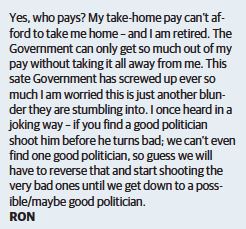Media Week: A troubled end to a troubling year
After a long hiatus, InDaily’s media column returns to reflect on a difficult year for journalism both at home and abroad.


Trump supporters "boo" members of the media during a campaign stop in Birmingham, Alabama, in December. Photo: AP/Eric Schultz
The bottom half of the internet
A day after the Russian ambassador to Turkey was shot dead at a public event, with a brave photographer continuing to do his job despite the grave risks, our local paper, The Advertiser, published the following letter to the editor.

I guess the letters editor thought the word “joking” was the get-out clause, but in the current climate, publication of such casually ugly words seems a terrible misjudgement.
Why? In June this year, 41-year-old British Labor MP Jo Cox was gunned down in the street by an attacker yelling “Put Britain first!” It was eerily similar to the attack in 2011 on US representative Gabby Giffords, who survived a bullet to the head to become a powerful voice for gun control.
If Ron was trying to be funny, he failed.
But perhaps the most concerning part of this was that Ron’s comment was in the “online” section of the letters pages.
This means his contribution was pulled out of the ruck from the comments section of AdelaideNow – the online version of the paper.
Not only did the comments moderator let it through, these words were deliberately elevated to prominence.
The Frankenstein effect
These events got me thinking about how this year is likely to be seen as a watershed in the decline of the mainstream media, and the growing divide between journalists, our readers and politicians.
It turned my thoughts to a question I have often asked myself as the traditional readership splinters and, in many cases, shrinks: have readers abandoned the mainstream media, or has the mainstream media abandoned its readers?
This is a conundrum that I have come back to repeatedly as I’ve seen the industry that I grew up in, the industry that I love (in a tumultuous kind of way), struggle and flounder to both keep its business model alive and keep faith with the best traditions of journalism.
Thousands of words have been written about Trump and Brexit, the rise of far right nationalism, and how the media “missed” the story.
The overarching narrative is that the media has become irrelevant.
I disagree, to a point.
Rather, I believe the decline of the media’s business model has seen journalists become the unwitting aides to the rise of a particularly ugly form of populism. This new political class (who pretend they’re not) has learned to harness a growing sense of nihilistic anger in the community, marked by naked contempt for authority. This dynamic has become mainstream, to the point that a credible newspaper like The Advertiser apparently thought little of publishing a comment closely aligned to the real and grotesque violence sweeping the world.
In our rush to find content – even in the form of “comments” from readers – we have let slip the standards that once bound us, damaging public trust in once venerated mastheads.
When I began my career 30 years ago in those sunny final years of newspaper hegemony, when young reporters stayed in five-star hotels, and millions of dollars rolled in the door with minimal effort, extreme voices were rarely heard in the media.
In fact, it was a common lament, of the Left in particular, that non-mainstream voices were never heard in the daily press.
Three decades down the track sees a vastly different landscape: the media’s easy money days are over, and the tide of discontent and political extremism is rising.
These days we have conspiracy theorists in the Australian Parliament and one about to enter the West Wing and no-one seems particularly surprised.
Of course, the media isn’t solely to blame: there are obviously numerous other factors at play, including military conflicts, global economic certainty and massive changes in the workplace.
But it’s hard to ignore the evidence that “we” – the media at large – have unwittingly created the circumstances in which the essentially empty and ineffectual ideas of dangerous populists are reproducing like viruses.
Public interest journalism is expensive and time-consuming – and won’t necessarily give a publisher the “clicks” they need, in a world where Facebook and Google are hoovering up most of the available digital revenue.
So instead of investing in difficult and sometimes “worthy” reporting, it’s much easier for the media to stoke the fires of the outrage machine with news of Twitter fights, easy “opinion” about the boring culture battle du jour, what Waleed nailed on The Project last night, or the endless hall of mirrors of reporting on what someone else reported about someone else’s report.
Hence, “talent” who say outrageous, offensive or otherwise provocative statements are gold for the new impoverished media.
We give them a platform, but in a world of direct social media channels, they quickly find they no longer need us.
Reality TV and a voracious popular media helped to make Donald Trump. Now he can unmake them.
The media is now engaged in a vigorous debate about how it needs to change to deal with a perceived new world, where we are aligned with the supposedly hated “elites” and don’t understand what the “real” people are experiencing.
I’m sure there are better strategies available for journalists to more comprehensively cover the western political malaise.
But maybe what is needed as well is a new mindset – a step to the higher ground, a true engagement with readers and community standards that values honesty and responsibility above clicks, a culture that isn’t afraid to admit fault and correct mistakes, a culture where comments like Ron’s are binned because they add nothing but bile to the body politic, where we play the issue not the person, where we listen to critics rather than try to pull them apart. Maybe then, our readers – or enough of them to matter – will start to trust us again, so that when we expose the lies of a populist game-player, people will believe us and not them.
It’s possible that I’m the fool – and a nostalgic one to boot – and that the only way for our profession to survive is by harvesting clicks at the low end so that the many fine journalists still working in South Australia, the nation and abroad can continue to do their important work in the upper reaches of public interest reporting.
The only problem with that theory is that even massive amounts of clicks aren’t cutting it any more: digital advertising is rushing out of the doors of news organisations and into the arms of Facebook and Google, which can offer cheaper and more targeted advertising than any media company and which, as the past year has graphically illustrated, do not care for the veracity of “news” promulgated through their massive global channels.
The answer to this conundrum is not clear.
What is obvious is that the world needs journalists now more than ever.
My fear is that even when we expose a terrible truth, no-one will believe us or, worse, no-one will care.
David Washington is editor of InDaily.




